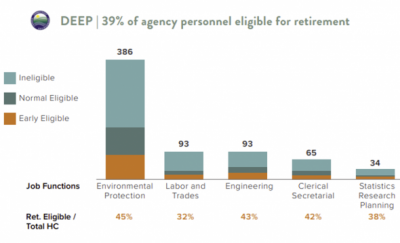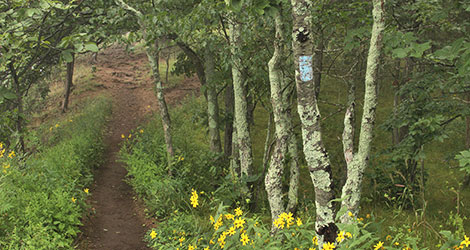
2022 Retirements Impacting DEEP
39% of DEEP’s employees overall and 45% of the Environmental Protection professionals who manage Parks and Forests were eligible to retire by July 1, 2022. What is DEEP doing to keep programs operational and special places maintained?
Step one is to take care of seasonal workers.
Almost 45% of DEEP’s Environmental Protection employees are eligible for retirement next year, compared to 39% overall for the department. Many state employees eligible for retirement left before July 1, 2022, because that is when future pension, health, and related benefits were reduced due to a state employees union agreement signed in 2017. Sadly, we lost many talented and experienced land managers who have been essential to the ongoing operations of State Parks, Forests, and Wildlife Management Areas and will be difficult to replace. Fortunately, some of these retiring workers have been able to stay on in a temporary capacity to facilitate transitions to new park, forest, and wildlife professionals.
The Lamont Administration commissioned a report to recommend improvements across state government to ensure service quality, delivery, and equity; mitigate retirement risks; and reduce costs. Recommendations to centralize, digitize, and automate governmental functions and systems may allow for sustaining operations with fewer people in some agencies, but for State Parks, Forests, and Wildlife Management Areas, you need well-trained land managers and visitor services professionals available on the front lines to be effective.

The DEEP summary pages in the CREATES report make a couple of critical points:
- DEEP must be allowed to increase the hourly pay for seasonal workers who are such a critical part of the DEEP workforce on state lands during the field season. At current hourly rates, DEEP is unable to recruit effectively for young talent at the front end, and is struggling to retain more experienced seasonal workers at the back end; and
- DEEP must do more to retain younger employees with fewer than five years of experience. This suggests that DEEP has inadequate pathways for career growth, and pay scales that don’t compete well with the private sector and may face significant brain drain issues when replacing employees who retire in the future.
“If DEEP cannot adjust hourly pay in order to attract qualified staff, it may have to close parks or services at a time when attendance is increasing. The inability to adjust pay for experienced seasonal workers is an example of how inflexibility in the State’s workforce management can impact the services it provides to residents.”
DEEP CREATES Report
We call upon the Lamont Administration to heed the report it commissioned, and enable DEEP to raise the hourly rates for seasonal workers immediately. This issue should be on the front burner right now as people continue to get outdoors in Parks, Forests, and Wildlife Management Areas in record numbers.
Here is a recent letter CFPA sent to OPM Secretary, Melissa McCaw requesting that this issue be addressed.





